This Ain’t The Help? OITNB’s White Savior Industrial Complex
Christina Belcher / University of Southern California
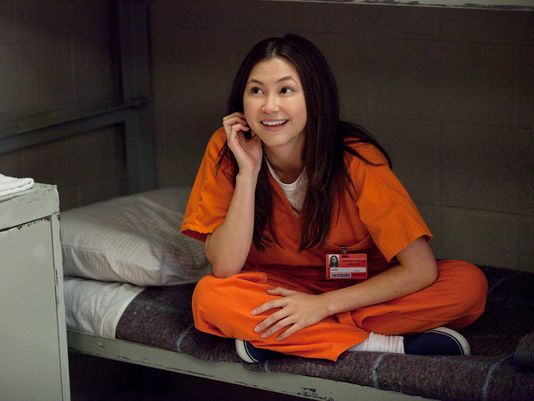
Intending to turn viewers into advocates, online prison reform campaign #humanityisthenewblack emerged with the second season of Netflix’s Orange is the New Black. With the New York Civil Liberties Union at the helm, the campaign shifts attention from the conditions of overflowing sewage and overuse of solitary confinement in the show’s fictional Litchfield Prison to the very real and detestable conditions at the jail in Riverhead, New York, where crews filmed parts of the second season. In addition to this type of effort by organizations hoping to gain support as a result of the show’s popularity, OITNB itself initiates a conversation about who can or should be an activist and/or ally in the fight for improved conditions in American prisons, and what methods they might use.1
If Season 1 fixated on Piper Chapman “[finding] herself” behind bars, Season 2 features numerous cast members with shifting moral compasses and character arcs that rival Chapman’s.2 The most consequential shift between seasons occurs when these characters decide to take action against the injustices within the prison, a concept that was virtually absent from Season 1. But as OITNB becomes more nuanced in its representation of prison activism, the show also takes its place in a long history of white benevolence on screen, from Mississippi Burning (1988) to Dangerous Minds (1995) to The Blind Side (2009). White inmates advocate for themselves and others, while inmates of color are too distracted by personal ambition to bother with the collective battles being waged behind bars, such as the hunger strike in protest of solitary confinement, unsanitary living conditions, and “compassionate” release for the elderly.3 With the exception of progressive-yet-naïve Brook Soso—who has Litchfield’s symbol of white privilege (a toothbrush at intake) bestowed upon her by Lorna Morello because “[she doesn’t] look full Asian”—OITNB portrays white saviors, in the form of sympathetic white correctional officers and selfless white prisoners, as the only legitimate forces in a fight for reform.
According to OITNB, women of color impede the reform work of white women. After black inmate Janae Watson returns from her latest stint in solitary confinement, her white friend Yoga Jones crosses Litchfield’s increasingly regulated racial lines in order to offer comfort, and to tell Watson that the arbitrary use of solitary “got [her] motivated to join the hunger strike.” Watson does not respond with the gratitude that Jones expects. Instead, she tells Jones, “I’m not here to make you feel good about yourself, alright? You got guilt about something, that’s not my problem.” Like many of the show’s potentially instructive confrontations between white women and women of color, the scene quickly shifts from a critique of white benevolence to a critique of black ingratitude, undermining the legitimacy of Watson’s accusations. As Watson tells Jones not to talk to her anymore, ending a friendship that formed in one of the first season’s most evocative moments, viewers are not permitted to linger with Watson, who has been brutalized by SHU over and over again across the show’s brief timespan. Instead, her face appears blurred on the edge of the frame while the camera rests on a close-up shot of Jones in disbelief. The scene ends with a white woman in tears, slighted by an angry black woman who is unwilling to accept an invitation to fight for justice and advocate for herself.
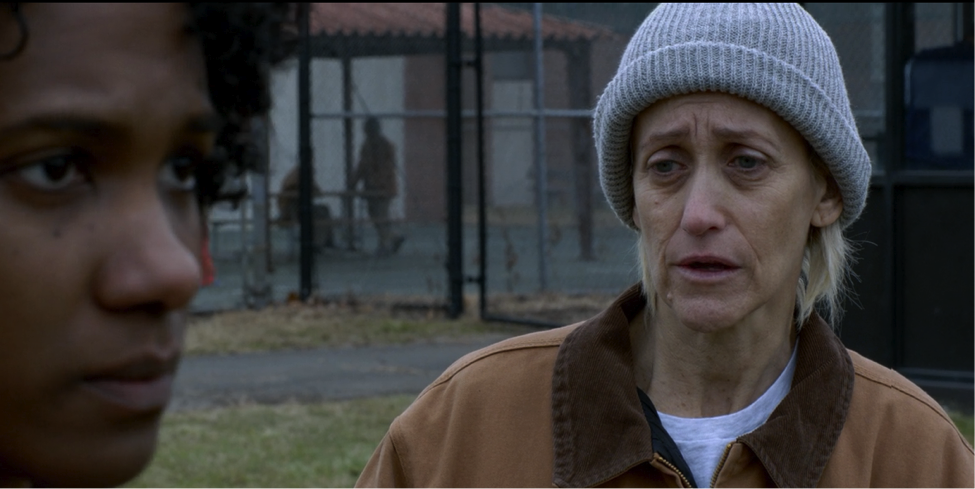
Jones returns to fellow strikers Soso and Ingalls, and white tweakers Leanne and Angie join them. Unlike Jones and Ingalls, the show portrays Leanne and Angie as inauthentic, particularly through the irony that their hunger strike demands involve the cafeteria food. When guards tempt the women with pizza, a tactic that prison officials actually use to break strikes, Leanne and Angie cave and eat to the delight of Ingalls, who reminds the more “respectable” strikers, “We don’t need them. They confuse our message.”4 OITNB pushes an activist ideal, and it doesn’t include women of color, drug addicts, or the poor: the majority of women serving time in America.5
Unlike Soso, Ingalls, and Jones, Piper Chapman’s entrance into the fight for prisoners’ rights at Litchfield is purely self-motivated. When journalist Andrew Yance visits Chapman to build his case against Natalie Figueroa’s embezzlement, Chapman refuses to help him. Although she claims to be an advocate for all of the programs that the prison has de-funded, she won’t risk her own release date for the good of the inmate population. Chapman’s determination to end Figueroa’s career comes at the heels of her furlough, when she convinces herself that Figueroa planned her transfer to a Virginia prison as a result of Healy granting her leave to visit her sick grandmother. By this logic, her white privilege is a burden, and she rides these delusions of victimhood into the fight against corruption.
No one—not Nance who schools her on the real ways that the prison system is failing, nor Sophia or Poussey who each tell heartbreaking stories of lock-up without furlough when their parents passed—can convince Chapman that she does not deserve to be furloughed for her grandmother’s hospitalization. At a moment when the efficacy of “call-out culture” is being debated across social media, it fails utterly on OITNB.6 Piper’s privilege is called out repeatedly, and her response, after she becomes the first known Litchfield inmate to be granted furlough, smacks of privilege-denial, white guilt, and downright disrespect: “Yes, I am white. We have established that. And I got furlough too. I guess white privilege wins again. And as a speaker for the entire white race, I would like to say I’m sorry you guys got the raw deal. But I love my fucking grandmother. And yeah, she may be a whitey too, but she’s a fucking person. And she’s sick and she needs me. So shut the fuck up.”
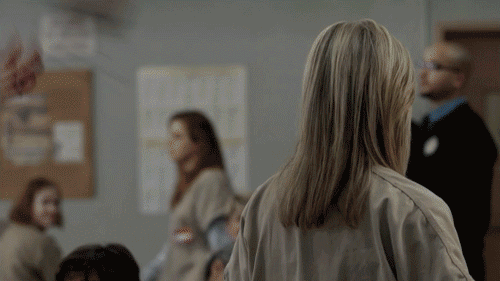
Ironically, Chapman is the woman ultimately responsible for ending corruption at Litchfield.
Suddenly flooded with white guilt that does nothing to change the reality of her privilege, Chapman rushes to Healy’s office, wishing to give her furlough back because there are people “more needy” than herself. Healy absolves Chapman of her guilt as he assures her that her whiteness did not motivate him; rather, he acted only in innocent kindness. So when Chapman becomes the inmate to dismantle corruption at Litchfield— rather than, say, Janae Watson—OITNB becomes yet another representation of whiteness stepping up and saving the day, this time for a prison populated mostly by women of color who are written out of the stories of their own struggles against oppression.
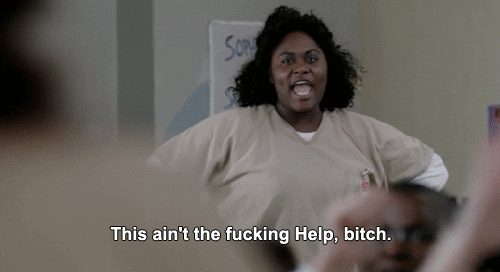
In his personal transition from heartless to bleeding heart, Officer Joe Caputo undergoes the most dramatic change of all. In Season 1, Caputo shows newly hired guard Susan Fischer the ropes; or rather, he shows her how to tighten them. His advice on how to maintain authority as a prison guard: “It helps if you don’t use their names. Just say “inmate,” like they’re all the same to you. It reminds them they’re not really people.” In Season 2, the same Caputo complains to counselor Sam Healy that “[he] would really like to report to someone who gave a shit about these women who [they] are supposed to be taking care of.”
Chapman helps Caputo bring Figueroa down, and by season’s end the show assures viewers that the human rights abuses are over. Sure, Caputo might have a few headaches in his new position as executive assistant to the warden, but as Chapman reminds him from her cell in a segregated block (where he put her), “You’re a good person. And Miss Figueroa, she isn’t.” For Chapman it’s that simple: trade bad administrator for good administrator, and Litchfield can become a functional correctional facility.
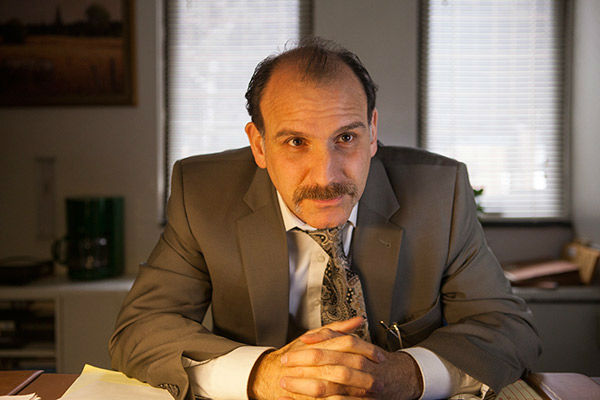
On the final episode of the season, Soso tells Chapman, “I don’t think I’m going to be the same when I get out.” Still wedded to her oft repeated, politically correct but incredibly misguided sentiment that she is “no different from anybody else in [prison],” Chapman suggests that, “maybe that’s ok.” For Chapman, prison is a place to improve herself and to “read all of the books on [her] Amazon wishlist.” Thankfully, Soso’s abbreviated response puts Piper’s delusions about prison’s efficacy to rest: “No, it’s not fucking ok.” She’s right. It’s not.
American media outlets inundate viewers with prison “entertainment,” from OITNB to Beyond Scared Straight to MSNBC’s marathon broadcastings of Locked Up.7 Meanwhile, the prison system itself is broken and dysfunctional, and we must start demanding that #humanityisthenewblack in the face of its atrocities. We can hope that the show inspires prison reform movements and prison abolition. But we must also hope that the actions of those non-incarcerated and/or white allies against this system of oppression take forms foreign to those of the white savior industrial complex played out on Orange is the New Black.8
Image Credits:
1. Brook Soso (Kimiko Glenn) on her first day in prison.
2. Erica “Yoga” Jones (Constance Shulman) after being slighted by Janae Watson (Vicky Jeudy). From Author’s Private Collection: Season 2 Episode 11, “Take a Break from your Values,” 6 June 2014, Dir. by Constantine Makris.
3. Suzanne Warren throws cake at Chapman after her “white privilege” speech in the cafeteria.
4. Tasha “Taystee” Jefferson (Danielle Brooks), delivering some of Litchfield’s most astute social commentary.
5. New Executive Assistant to the Warden, Joe Caputo (Nick Sandow).
Please feel free to comment.
- Various authors have considered the efficacy of #HashtagActivism. One piece I found particularly engaging is Michael Holtzman’s, which you can read here. [↩]
- The show’s promotional advertising for the first season featured a double entendre about Piper Chapman’s “journey” in prison: “This July… a provocative new series… about finding yourself… behind bars.” Chapman’s journey was certainly the show’s focus. While Season 2 developed characters that were previously secondary, letting Chapman take a back seat to the season’s central tensions, this is not the trajectory that all of the supporting characters follow, and some follow an opposite trajectory. For example, other critics have commented on Sophia Burset’s transition from a character with depth and history to a stock transgender character who exists only “as a mouthpiece for what the show clearly identifies as the correct and progressive political line on sexuality and gender politics” on Season 2 (Nair). See Yasmin Nair, “The Reign of Whitey Is Never Over.” In These Times. 11 June 2014. http://inthesetimes.com/article/16819/the_reign_of_whitey_is_never_over [↩]
- My critique of the show’s characterization of prison reform and the characters chosen to pursue it is not meant to denigrate the work that many of the show’s actresses are doing. Laverne Cox, Samira Wiley, Alysia Reiner, Kate Mulgrew, Uzo Aduba, and certainly memoir author Piper Kerman have spoken out in support of prison reform. Other critics have claimed that Piper Kerman’s activist work is part of a “white savior industrial complex” through which she profits off the stories of the women of color with whom she was incarcerated. You can read a version of that critique here. [↩]
- See descriptions of tactics used against strikers in the most recent California prison strike [↩]
- According to The Sentencing Project, 1 in 111 white women will be sentenced to prison in her lifetime, whereas 1 in 18 black women and 1 in 45 Latina women will be incarcerated. [↩]
- The recent debate about “call out culture” originated with Jack Halberstam’s post on Bully Bloggers, You Are Triggering me! The Neo-Liberal Rhetoric of Harm, Danger and Trauma. Various writers have responded to Halberstam. [↩]
- A recent episode of John Oliver’s HBO talk-show Last Week Tonight focused on the prevalence of prison in American entertainment and lives, to such an extent that PBS’s Sesame Street was compelled to explain prison to a vast population of children who have incarcerated adults in their lives. You can find a video of this segment here. [↩]
- Many writers/activists have contributed blog posts and editorials about the proper and productive role of allies in the wake of the Michael Brown murder in Ferguson, MO. Because the ideas she outlines apply to becoming an ally in the fight for prison reform, I suggest reading Janee Woods’ “Becoming a White Ally to Black People in the Aftermath of the Michael Brown Murder” for alternatives to #HashtagActivism, and to the portrayal of justice work on Orange is the New Black. [↩]
It feels impossible to ever even hope to do anything right, when it comes to wanting to help others right now, and that is just a feeling I can’t find a word for. After reading Piper Kerman’s book, before “everyone” started dressing like characters from the Netflix show based on her book, using Twitter and Facebook to giggle and use the hash tag “#ontuesdayswewearorange (if I recall correctly), ‘shipping “Vauseman” or girls giddy about “going gay for Stella!”… when I read the book, it changed my thinking.
But now, how I think or act is irrelevant, because I am told my white privilege means I need to shut up. Even though I have nothing but time on my hands, a desire to do something to help, and live in a state with one of the WORST, most vile prisons in the country, I’m told I cannot do anything for the women incarcerated there. Why? I live below the poverty line. I eat food bought with an EBT card. I sleep on a blow-up mattress on the floor of one room.
I have a disability and have had help along the way. I have been alone for two decades, and I cried when I read (I like research, so after reading Kerman’s book, I looked into how in the Heck I could do something to make someone else’s life suck a bit less; maybe send books, write letters).
There was so much red tape, and I pretty much gave up. Then the show happened, and I remembered how much I wanted to be helpful. NOW the color that is standing in the way? My alleged “while privilege”. So, despite so many of the hard stuff I have been through in life and how I DON’T want to waste it, I keep running into mainly young women actually, who say I need to shut my white mouth and blah blah… why? Why is it wrong for me, in my room alone day in and day out, to want to tell people, “You matter. I know you have worth”, or anything positive?
The world feels upside down when kindness is in short supply, and we who want to actively show kindness in humility, in our -my- frailty, to people who are in a crappy situation. Women are regularly raped in the prison here, and these are ladies who are in prison for possession of marijuana, for writing bad checks, and so many are because of abusive husbands or boyfriends.
This white privilege thing shouldn’t be applied to all people with white skin, just as we should not assume that all people of color are criminals or … whatever is assumed (I guess I am just stupid, I grew up with people of every color, so this just was not my or my peers’ experience). Please don’t push me away. What the hell else should I do about injustice to others? White people stood shoulder to shoulder with African Americans in the 1960s, and some died. What if they were told “Sorry, no, you can’t help us gain our civil rights, you have White Privilege”.
We all have to help each other. This world is sad and broken, and if we who want to help make it better? Shutting us out because of shit like I read about last week (OITNB is Trauma Porn for white people?? WHAT?! Hi, was actually raped 20 years ago, it’s not entertainment), well, that is not logical. And I am beyond frustrated. It used to be that not helping was bad, now wanting to help is wrong.
I won’t give up. People are in need. It bothers me so much more, going back to the Netflix show example, that girls dress up for Halloween in orange shrubs, but have no idea that this state has a place that makes Litchfield truly look like summer camp.
Badison was the worst OITNB character ever imagined. Thanks for that. I felt like the Writers from Seasons 1-5, retired and we got High School Writers Class stand ins for this last season that smelled like a Series ender in every way possible. Like…We don’t care anymore and it feels like Orange is the New Black, doesn’t either.